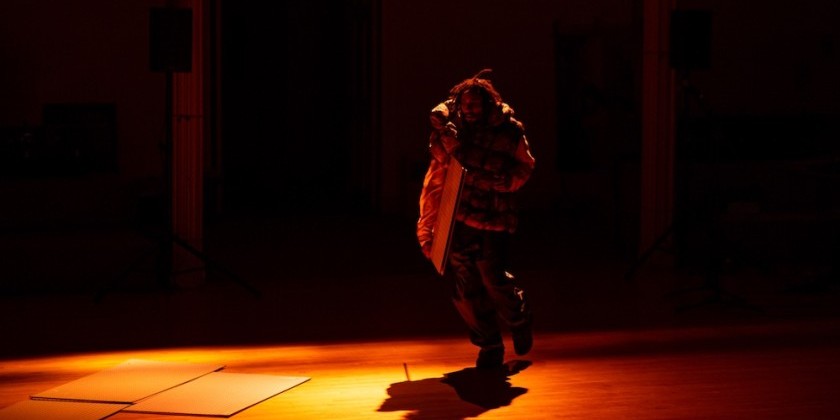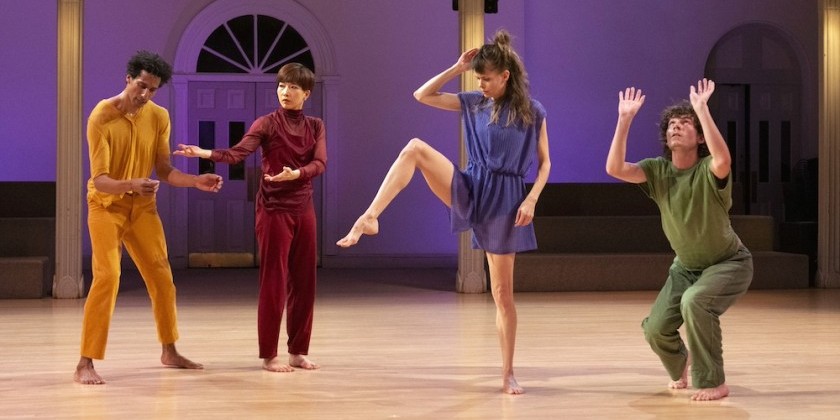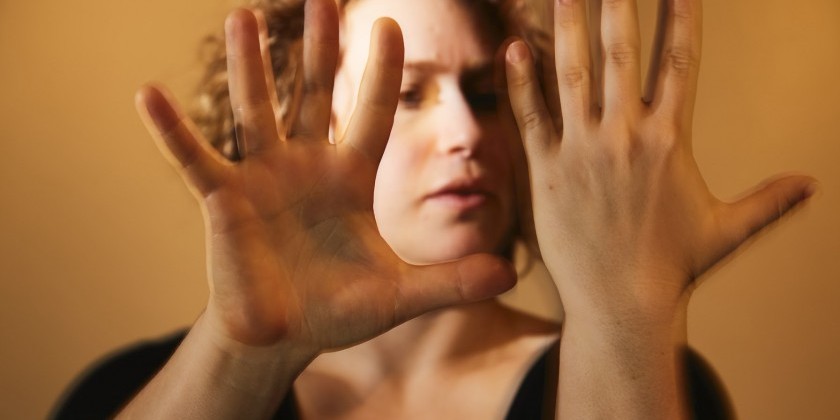IMPRESSIONS: Melinda Ring's “Strange Engagements” at Danspace Project

February 1, 2020
Choreography: Melinda Ring
Performed by: Laurel Atwell, Paul Hamilton, Rainey White, Sam Kim, and Talya Epstein
Lighting designer: Kathy Kaufmann
Danspace Project resounds with a muted, percussive clamor. Limbs create rhythms: heels pound and rebound, flesh shakes and claps against the floor, hands slap asses and feet thump torsos. Sweat drips. Five dancers arch in mock-tantric clinches; bodies fling, with arms swinging and legs akimbo, across vast space.
In Melinda Ring’s Strange Engagements, there is the illusion of chaos within a rigorous score. The movement has an intense depth and a deceptive diversity. What appear to be spontaneous innovations or quirks — trembling limbs, bouncing torsos, looping locomotions around the space — surface again and again, recontextualized and thus unrecognizable. The tasks, and the dancers, get exhausted and become different.

The dancers’ tasks subvert the personal; they make indulgence irrelevant. The piece is a Rube Goldberg machine of random yet interconnected cause and effect, with a sound score of fleshy noise.
Ring sets up the stage to contain both randomness and order, a postmodern take on negative capability. That’s a fancy phrase, but bear with me. According to the poet John Keats, negative capability is the feeling of “being in uncertainties, Mysteries, doubts, without any irritable reaching after fact & reason” (Selections from Keats's Letters by John Keats). It is a feeling that goes beyond personal preference and good taste toward open-ended questions. It is experienced by the artist in the making process, and, presumably, conveyed to the audience. Keats thinks of negative capability as hinging on Beauty (yes, capital B beauty); Ring, however, reimagines the sensation in relation to the transcendent Task (it deserves a capital letter now, too).

Nothing could be more clear in the restless bodies traversing the space. We’re not asked to understand, or even to articulate a story. We are invited instead to see the layers of motion as they accumulate and dissipate. Though this method isn’t new and the shapes remind me of other postmodern work, Strange Engagements provides room for my eye to build fresh webs of meaning amidst the gyrations.
Inspired by Ring’s invitation to free-associate, I enumerate the things I see the dancers endeavoring to do. My imagination roams in the structures Ring creates.

A pile of torsos and legs and hands topped by tassels of hair gyrates and pulses. Task: stay connected to each other and shake until the group pulls apart. The quintet freezes, scattered equidistant from each other on the floor with legs crossed at the knees like bizarre sculptures in a garden. Task: hold the shape while sensing the distances and proximities of the group. A trio sprawls away from the other dancers to clamber over each other. Task: become a tripartite knot, and come undone. Rainey White and Paul Hamilton cross the space on relevé with small steps, their arms outstretched. Task: approach yourself in a mirror. Laurel Atwell stands facing the nave, hands high and hips loose, drumming the floor with heels like twin hammers. Task: accompany yourself on a drum machine. Talya Epstein’s legs wobble and collapse repeatedly in luscious surrender to gravity. Task: enjoy falling.

Crystalline images — what look like elaborations on the set movement — arise from the messy, raw wash of physical effort. Atwell kicks like a cheerleader, pumps fists overhead, and runs in loping strides around the stage. Sam Kim pins Hamilton to the floor with authoritative force, and Hamilton arches back luxuriously and flaps both arms like a swan, over and over, as if living out a lush fantasy. Somebody on stage says, “Ok, good,” and the lights go black.











